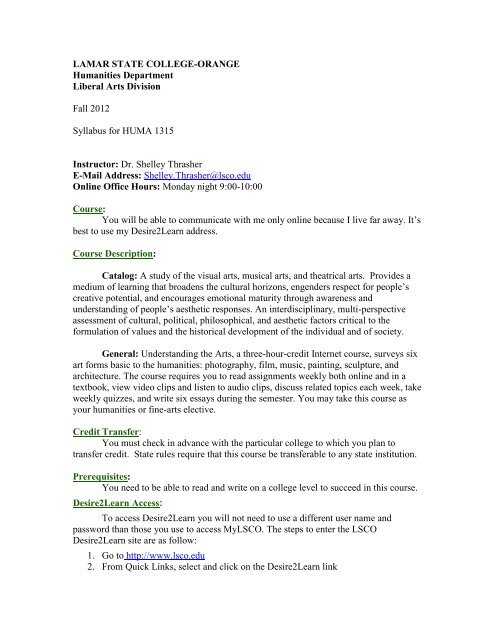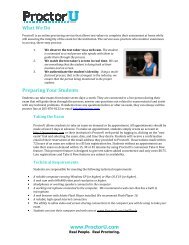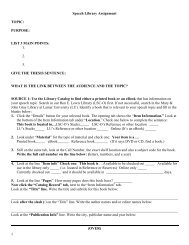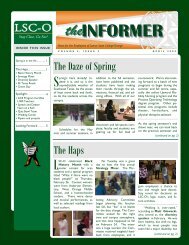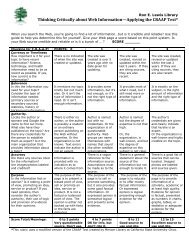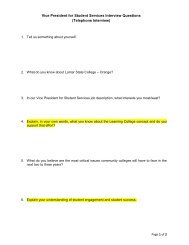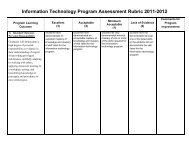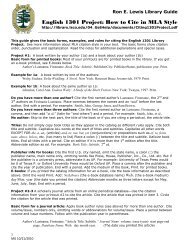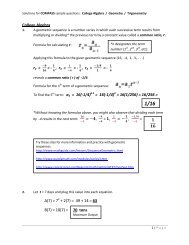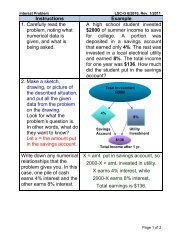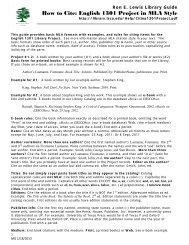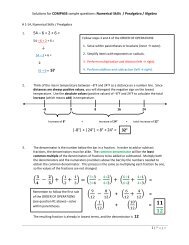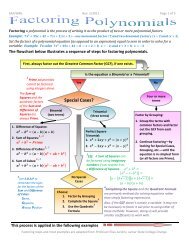HUMA 1315 Syllabus - Lamar State College-Orange
HUMA 1315 Syllabus - Lamar State College-Orange
HUMA 1315 Syllabus - Lamar State College-Orange
You also want an ePaper? Increase the reach of your titles
YUMPU automatically turns print PDFs into web optimized ePapers that Google loves.
LAMAR STATE COLLEGE-ORANGE<br />
Humanities Department<br />
Liberal Arts Division<br />
Fall 2012<br />
<strong>Syllabus</strong> for <strong>HUMA</strong> <strong>1315</strong><br />
Instructor: Dr. Shelley Thrasher<br />
E-Mail Address: Shelley.Thrasher@lsco.edu<br />
Online Office Hours: Monday night 9:00-10:00<br />
Course:<br />
You will be able to communicate with me only online because I live far away. It’s<br />
best to use my Desire2Learn address.<br />
Course Description:<br />
Catalog: A study of the visual arts, musical arts, and theatrical arts. Provides a<br />
medium of learning that broadens the cultural horizons, engenders respect for people’s<br />
creative potential, and encourages emotional maturity through awareness and<br />
understanding of people’s aesthetic responses. An interdisciplinary, multi-perspective<br />
assessment of cultural, political, philosophical, and aesthetic factors critical to the<br />
formulation of values and the historical development of the individual and of society.<br />
General: Understanding the Arts, a three-hour-credit Internet course, surveys six<br />
art forms basic to the humanities: photography, film, music, painting, sculpture, and<br />
architecture. The course requires you to read assignments weekly both online and in a<br />
textbook, view video clips and listen to audio clips, discuss related topics each week, take<br />
weekly quizzes, and write six essays during the semester. You may take this course as<br />
your humanities or fine-arts elective.<br />
Credit Transfer:<br />
You must check in advance with the particular college to which you plan to<br />
transfer credit. <strong>State</strong> rules require that this course be transferable to any state institution.<br />
Prerequisites:<br />
You need to be able to read and write on a college level to succeed in this course.<br />
Desire2Learn Access:<br />
To access Desire2Learn you will not need to use a different user name and<br />
password than those you use to access MyLSCO. The steps to enter the LSCO<br />
Desire2Learn site are as follow:<br />
1. Go to http://www.lsco.edu<br />
2. From Quick Links, select and click on the Desire2Learn link
3. At this site, enter your username (your myLSCO username) and password (your<br />
date of birth in six digits, such as 120989).<br />
4. You should now be at your Homepage, where you can access <strong>HUMA</strong> <strong>1315</strong>.80.<br />
OR<br />
1. Go to http://lsco.desire2learn.com/<br />
2. Log in with your username and password, as described above.<br />
3. Access <strong>HUMA</strong> <strong>1315</strong>.80<br />
OR<br />
1. Log in to myLSCO<br />
2. Click the STUDENT tab<br />
3. Click MyCourses<br />
4. Scroll down to the Fall 2011 Semester<br />
5. Click <strong>HUMA</strong> <strong>1315</strong>.80<br />
Computer Problems:<br />
If you have any computer problems and cannot complete your assignment or log<br />
on to Desire2Learn, you must contact me immediately by emailing me at<br />
shelley.thrasher@lsco.edu. We will make arrangements for you to complete your<br />
assignment. BE SURE NOT TO WAIT UNTIL THE LAST MINUTE TO TRY TO<br />
SUBMIT YOUR PROJECT AND ARRANGE WITH A FRIEND OR FAMILY<br />
MEMBER FOR A BACKUP COMPUTER IN CASE YOURS FAILS.<br />
To learn how to upload and download files, be sure to look at the Desire2Learn<br />
Tutorials located in the left corner of your Desire2Learn homepage. For technical<br />
concerns contact the Help Desk in Room 101 of the Academic Center. You may also call<br />
the Help Desk at 409-882-3968 or e-mail desire2learn@lsco.edu. The Help Desk is open<br />
from 7:30 till 5:00 Monday through Friday.<br />
Required Textbook and Other Means of Communication:<br />
The Arts: World Themes, by Geraldine Nagle. New York: Brown and<br />
Benchmark, 1997.<br />
Three video and audio CDs, available at the beginning of the semester. (If you<br />
have access to high-speed Internet, you may not need these CDs.)<br />
Access to a computer using a recent version of Internet Explorer, Mozilla Firefox,<br />
or Safari; Java enabled, with word processing software (Word or WordPad), and virusprotection<br />
software. (Internet Explorer seems to work best for viewing the online video<br />
and audio clips provided in this course.)<br />
Supplemental Materials:<br />
The <strong>Lamar</strong>-<strong>Orange</strong> Library has a plentiful supply of books, CDs, and DVDs to<br />
help you with the assigned projects. If you need additional resources, please ask the<br />
librarian to help you order appropriate material through our interlibrary loan services.<br />
Student Learning Outcomes:<br />
1. Demonstrate awareness of the scope and variety of works in the arts and<br />
humanities.
Activity: You will read, watch, listen, and otherwise be exposed to a wide<br />
variety of works of art in this course, from ancient cave paintings to<br />
contemporary electronic music.<br />
2. Understand those works as expressions of individual and human values<br />
within an historical and social context.<br />
Activity: Each of the six sections in this course begins with a historical<br />
overview of the art forms we are studying. You will be exposed to the arts of<br />
Asian and African cultures, as well as those prevalent in Europe and America.<br />
3. Demonstrate knowledge of the influence of the arts on intercultural<br />
experiences.<br />
Activity: In our weekly online discussions we will tackle questions that ask<br />
you to examine the effect of the arts on your dealings with people of other<br />
cultures. Some of the required reading material should also encourage you to<br />
begin to understand in what varied ways the people of diverse cultures express<br />
their values and perspectives on life through the arts.<br />
4. Develop an appreciation for the aesthetic principles that guide or govern the<br />
humanities and arts.<br />
Activity: In the second part of each unit of study, you will be exposed to the<br />
technical aspects of the art form studied, such as film editing and the basic<br />
building structures that architects use.<br />
5. Comprehend the physical and intellectual demands required of the author or<br />
visual or performing artist.<br />
Activity: The third area of study in each unit focuses on the individual artist<br />
and the dedication, talent, and hard work required to successfully create an<br />
enduring work of art. The photography assignment, which requires you to take<br />
and analyze a photograph that has the elements required for a great shot,<br />
should give an idea of just how difficult it is to create a true work of art.<br />
6. Demonstrate critical thinking skills as evidenced by the ability to analyze<br />
facts, synthesize factual information, and evaluate opinions in light of the<br />
facts presented throughout this course.<br />
Activity: In five of the six written assignments in this course, you will be<br />
required to synthetize information about a given work of art and its creator,<br />
analyze its outstanding features, and evaluate it according to guidelines that<br />
you will be exposed to during each unit of study. These essays are the basis<br />
for the bulk of your semester grade.<br />
7. Articulate an informed personal reaction to works in the arts and humanities.<br />
Activity: Not only will you have an opportunity to express your personal<br />
reactions to given works during our weekly online discussions, but you are<br />
encouraged to do so in the evaluation section of each written essay.<br />
8. Demonstrate a high level of personal self-discipline and motivation.<br />
Activity: By completing your weekly quiz and participating in each weekly<br />
discussion thoughtfully and on time, you will exhibit self-discipline and<br />
motivation. By beginning each required essay well ahead of its due date,<br />
pondering it in connection with the information provided in the material to<br />
which you have been exposed, researching and planning your content<br />
carefully, and writing it clearly and correctly, you will also exhibit self-
discipline and motivation, as well as allow yourself the possibility of<br />
producing creative and worthwhile essays.<br />
Course Outline:<br />
1. Introduction, Photography, and Film<br />
2. Music and Painting<br />
3. Sculpture and Architecture<br />
In addition to the general information about Desire2Learn on YouTube, be sure to<br />
watch the two videos there in which I explain the basics of this course.<br />
In this course you will read weekly assignments online and in your text, access<br />
various audiovisual clips on your CDs or online, participate in a weekly online<br />
discussion, and take a weekly quiz. The bulk of your grade will be based on weekly<br />
quizzes and six written projects, one for each art form studied.<br />
The accompanying reading, discussion, quiz, and project assignments are listed in<br />
the course schedule at the end of this syllabus and in the detailed online schedule in the<br />
Content Module.<br />
Critical Thinking:<br />
Critical thinking is a process involving higher-order thinking skills. These skills<br />
include, but are not limited to, application, analysis, synthesis, and evaluation of factual<br />
information. <strong>Lamar</strong> <strong>State</strong> <strong>College</strong>-<strong>Orange</strong> Advances Critical Thinking Skills (LSC-O<br />
ACTS) through assignments of varying natures within the course that are designed to<br />
challenge and improve your critical-thinking processes.<br />
In this course, you will be asked to complete six projects designed to help you<br />
develop your skills as a critical thinker. Each project will focus on three major elements<br />
of critical thinking: description, analysis, and evaluation. You will be provided detailed<br />
instructions and examples for each assignment. The weekly quizzes and discussions<br />
encourage you not only to read and understand the assigned reading, etc. in this course,<br />
but also to think about the information and art forms to which you have been introduced.<br />
We will concentrate on the skill of analysis, which your post-test will focus on.<br />
A well cultivated critical thinker 1 :<br />
· Raises vital questions and problems, formulating them clearly and precisely;<br />
· Gathers and assesses relevant information, using abstract ideas to interpret it<br />
effectively;<br />
· Comes to well-reasoned conclusions and solutions, testing them against relevant<br />
criteria and standards;<br />
· Thinks open-mindedly within alternative systems of thought, recognizing and<br />
assessing, as need be, their assumptions, implications, and practical<br />
consequences; and<br />
· Communicates effectively with others in figuring out solutions to complex<br />
problems.
1 Paul, Richard & Elder, Linda. (2005). The Miniature Guide to Critical Thinking<br />
Concepts & Tools. Dillon Beach: The Foundation for Critical Thinking.<br />
Evaluation Methods:<br />
Twelve quizzes, over your weekly reading assignments, will count 300 points<br />
of your final grade in this course. Each quiz, which is worth 30 points, will consist of<br />
multiple-choice and true/false questions. You will have two chances to take each quiz<br />
and may drop your two lowest quiz grades during the semester.<br />
You will also be required to take a brief comprehensive post-test, worth 30<br />
points, which is designed to provide information about how well you have mastered the<br />
skill of analysis in this course. You must respond to these 30 questions in order to pass<br />
this course.<br />
Of the twelve weekly discussions that you participate in, worth 8 points each, I<br />
will count your ten highest grades, for a possible total of 80 points. Each discussion will<br />
focus on a topic related to what you are studying that week.<br />
Six projects, one for each art form studied, will determine 600 points of your<br />
final grade in this course. Five of the projects will be entirely written, and one of them<br />
will require you to take and edit a photograph. Each project counts 100 points.<br />
You will be able to earn 4 bonus points at the beginning of the semester, by<br />
completing a brief assignment and two quizzes, and 10 points at the end, by writing a<br />
bonus essay. Try to take advantage of these opportunities to improve your grade.<br />
1000 - 900 = A, 899 - 800 = B, 799 - 700 = C, 699 - 600 = D, Below 60 = F<br />
Policy on a Grade Incomplete:<br />
The grade of “I” may be given when you do not complete any requirement of the<br />
course, including the final examination, and arrange with me to complete these<br />
requirements. You must finish incomplete work during the next long semester; if not, the<br />
Admissions and Records Office must change an “I” grade to the grade of “F.” You must<br />
then repeat the course, if you want credit for it. An “I” grade also automatically becomes<br />
an “F” if you register for the course before removing the deficiencies and receiving a<br />
grade change. I may give you an “F” if you don’t take the post-test and/or are not passing<br />
the course.<br />
Procedure for Review of Test Grades:<br />
If you have an issue about your grade on any of your discussions, quizzes, or<br />
essays or on your semester’s work, you must contact me no later than three (3) days after<br />
receiving the grade.<br />
Make-up Policy and Deadlines:<br />
Your twelve quizzes and discussions are usually due each Monday right<br />
before midnight, at the latest, although three of the due dates are on a Wednesday.<br />
After the due date, you may not take the quiz or submit a discussion and will receive<br />
a zero for that missed quiz or discussion.
Three of your six projects are also due on a Monday near midnight, and the<br />
other three are due late on a Friday. Check your course schedule carefully, for I will<br />
not accept any late projects.<br />
Classroom Policies and Etiquette:<br />
In the library, Learning Resource Center, and online, you should behave in ways<br />
that do not offend others. Be polite, be considerate, and be tolerant of others’ views,<br />
please.<br />
Attendance:<br />
You need to watch the two YouTube videos that I have filmed, available online,<br />
to help you get an idea of what this course will be like. And if this is your first online<br />
course, you need to watch the general YouTube videos. You also should read your<br />
assignments, participate in the discussions, submit your six required assignments, and<br />
take your required quiz each week, as well as the post-test. Be aware that I am able to<br />
track how much time you spend reading the online lectures.<br />
Withdrawals and Drops:<br />
Last day to drop or withdraw with a Q or a W: September 26, 2011.<br />
Last day to drop or withdraw from the spring semester: October 31, 2011.<br />
In order to drop or withdraw from this course, you need to go to the advising<br />
office (Room 355, LSCO Library) or the registrar’s office (Room 341, LSCO Library).<br />
They will give you the proper form, which you must fill out.<br />
If you do not complete the first assignments, I will not automatically drop<br />
you from the course. You remain registered until you file a drop/withdrawal form at the<br />
registrar’s office by the appropriate deadlines. If you miss the deadlines you will receive<br />
an "F" for the course. It is your responsibility to turn in all drop/withdrawal forms<br />
and follow up to ensure that they were processed as desired.<br />
Academic Honesty:<br />
LSCO will not tolerate cheating or plagiarism. Plagiarism is defined as “taking<br />
and using as one’s own the writings or ideas of another.”<br />
Any student caught cheating or plagiarizing, or aiding another student in cheating<br />
or plagiarizing on an examination or project, will receive an “F” in the course.<br />
Students subject to penalty due to academic dishonesty have the right to appeal<br />
to the department chair and eventually to the dean and/or academic vice president before<br />
the penalty is imposed.<br />
Student with Disabilities:<br />
If you have a verifiable learning or physical disability that requires course<br />
modification, you must e-mail me regarding the disability.<br />
You must make a request for special accommodations through the ADA<br />
Counselor and submit the appropriate form to me at least two weeks before you need<br />
the course modifications.
Children in the Classroom:<br />
The LSCO Student Handbook specifies that no children under the age of fifteen<br />
be allowed in the classroom or the hallways.<br />
<strong>Syllabus</strong> Content:<br />
I reserve the right to make changes to this syllabus, if they are necessary. I will<br />
provide any changes to you in writing before they are implemented, if possible.<br />
COURSE SCHEDULE AND MAJOR ASSIGNMENTS<br />
UNIT 1---INTRODUCTION, FILM, AND PHOTOGRAPHY<br />
WEEK OF SUBJECTS STUDIED QUIZZES PROJECTS<br />
Aug. 22 What is Humanities? 1 (Practice) Orientation Assign<br />
Aug. 29 History of Photography and Film 2<br />
Sept. 6 Photography and Film Techniques 3<br />
Sept. 12 Form and Meaning in Photos and Film 4 Film Critique<br />
Sept. 19 Photo and Film Criticism 5 Photograph<br />
UNIT 2---MUSIC AND PAINTING<br />
WEEK OF SUBJECTS STUDIED QUIZZES PROJECTS<br />
Oct. 3 History, Basic Elements of Music 6<br />
Oct. 10 Music Form, Meaning, Non-Western 7 Music Essay<br />
Oct. 17 History, Basic Elements of Painting 8<br />
Oct. 24 Painting Form, Meaning, Non-Western 9 Painting Essay<br />
UNIT 3---SCULPTURE, ARCHITECTURE, AND EPILOGUE<br />
WEEK OF SUBJECTS STUDIED QUIZZES PROJECTS<br />
Nov. 7 Sculpture History, Types, Techniques 10
Nov. 14 Sculpture—Modern, Around the World 11 Sculpture Essay<br />
Nov. 21 Architectural History and Elements 12<br />
Nov. 28 Architecture---Modern, Around the World 13 Architecture Essay<br />
Epilogue—Time Travel<br />
Bonus Project<br />
Post-Test


